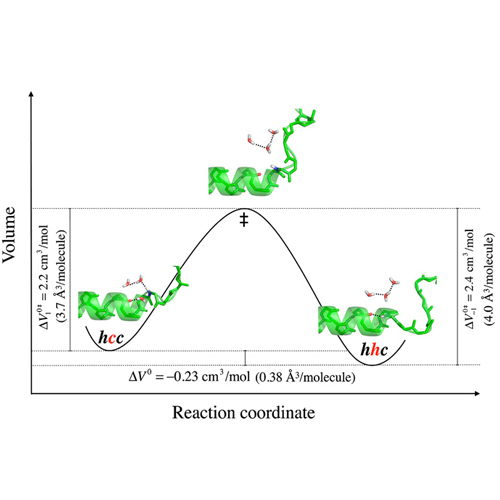Transition state and ground state properties of the helix–coil transition in peptides deduced from high-pressure studies
24-Dec-2013
PNAS, 2013, doi: 10.1073/pnas.1317973110, vol. 110 no. 52 published on 24.12.2013
PNAS, online article
PNAS, online article
Volume changes associated with protein folding reactions contain valuable information about the folding mechanism and the nature of the transition state. However, meaningful interpretation of such data requires that overall volume changes be deconvoluted into individual contributions from different structural components. Here we focus on one type of structural element, the α-helix, and measure triplet–triplet energy transfer at high pressure to determine volume changes associated with the helix–coil transition. Our results reveal that the volume of a 21-amino-acid alanine-based peptide shrinks upon helix formation. Thus, helices, in contrast with native proteins, become more stable with increasing pressure, explaining the frequently observed helical structures in pressure-unfolded proteins. Both helix folding and unfolding become slower with increasing pressure. The volume changes associated with the addition of a single helical residue to a preexisting helix were obtained by comparing the experimental results with Monte Carlo simulations based on a kinetic linear Ising model. The reaction volume for adding a single residue to a helix is small and negative (−0.23 cm3 per mol = −0.38 Å3 per molecule) implying that intrahelical hydrogen bonds have a smaller volume than peptide-water hydrogen bonds. In contrast, the transition state has a larger volume than either the helical or the coil state, with activation volumes of 2.2 cm3/mol (3.7 Å3 per molecule) for adding and 2.4 cm3/mol (4.0 Å3 per molecule) for removing one residue. Thus, addition or removal of a helical residue proceeds through a transitory high-energy state with a large volume, possibly due to the presence of unsatisfied hydrogen bonds, although steric effects may also contribute.











